Overview
In the realm of software development, developers often encounter significant coding challenges that can hinder their progress. Addressing essential technical bug types is crucial for ensuring efficient software development and delivering high-quality applications. Bugs such as functional defects, performance issues, and security vulnerabilities can arise, creating obstacles that need to be overcome.
This is where Kodezi comes into play. With its innovative features, Kodezi streamlines the debugging process, allowing developers to tackle these common issues more effectively. By utilizing tools designed to enhance productivity, Kodezi empowers developers to focus on what truly matters: writing clean, efficient code.
Imagine being able to significantly reduce the time spent on debugging while simultaneously improving code quality. The benefits of using Kodezi are clear—enhanced productivity and a smoother development experience. As developers, wouldn't you want to explore how these tools can transform your coding practices?
In addition, Kodezi not only addresses the technical aspects of coding but also fosters a more efficient workflow. By integrating these tools into your development process, you can achieve a higher standard of software quality. So, why not take the next step? Explore the features available on Kodezi and elevate your coding experience today.
Introduction
In the fast-evolving landscape of software development, coding challenges are a common hurdle for developers. The ability to swiftly identify and resolve issues is paramount for maintaining high-quality code and ensuring user satisfaction. As developers navigate a complex array of challenges—from functional defects and performance issues to usability errors and security vulnerabilities—tools like Kodezi are revolutionizing the debugging process.
Furthermore, Kodezi automates code debugging and provides comprehensive insights, addressing these challenges effectively. By streamlining the debugging process, Kodezi empowers developers to enhance their productivity and tackle bugs with unprecedented efficiency. Imagine being able to resolve issues faster and with greater accuracy—this is the promise that Kodezi brings to the table.
In addition, the benefits of using Kodezi extend beyond mere efficiency; it significantly improves code quality, which in turn enhances user experience. Developers can focus more on innovation rather than getting bogged down by persistent bugs. This article delves into the multifaceted world of software bugs, exploring their various types, the impact they have on user experience, and the essential strategies for effective resolution.
Finally, we encourage you to explore the tools available on the Kodezi platform. By leveraging modern debugging tools, developers can foster seamless software development and ultimately deliver superior products to users.
Kodezi | Professional OpenAPI Specification Generator - AI Dev-Tool: Automated Code Debugging for Efficient Bug Resolution
Developers often encounter significant challenges caused by a technical bug when debugging their code, which can impede their productivity. Kodezi's automated code debugging feature addresses these issues effectively, enabling programmers to swiftly identify and resolve bugs within their codebases. This tool not only detects problems but also provides comprehensive explanations of any technical bug encountered and the solutions applied. By streamlining the debugging process, Kodezi significantly boosts programmer productivity and minimizes the impact of technical bugs, allowing tasks to be completed up to two times quicker than conventional methods. This efficiency is crucial for programmers managing multiple projects, ensuring their code adheres to professional standards without compromising quality.
Real-world scenarios illustrate the effectiveness of automated debugging tools like Kodezi. Developers have reported that Kodezi's capabilities enable them to maintain high-quality code while navigating complex coding requirements. For instance, a case study highlighted that although generative AI tools may struggle with intricate prompts, Kodezi's organized approach simplifies debugging, emphasizing the importance of human supervision in complex situations.
The latest advancements in automated debugging applications, including Kodezi, reflect a growing recognition of the need for robust debugging solutions in the development process. Efficient debugging is essential for maintaining code quality, especially in resolving technical bugs, with reports indicating that companies have experienced a faster onboarding process for new programmers due to enhanced debugging tools. As the landscape of application development evolves, Kodezi emerges as an indispensable resource for developers looking to boost their productivity while ensuring their code remains secure and efficient.
Functional Defects: Understanding the Backbone of Bug Detection
Functional defects present significant challenges for developers, arising when applications fail to operate as intended according to their specifications. These issues can stem from incorrect logic, overlooked requirements, or integration errors. Understanding functional defects is crucial for programmers, as they directly impact customer experience and software reliability. Furthermore, routine testing and validation against requirements can aid in identifying these flaws early in the development process, ensuring that the final product meets expectations.
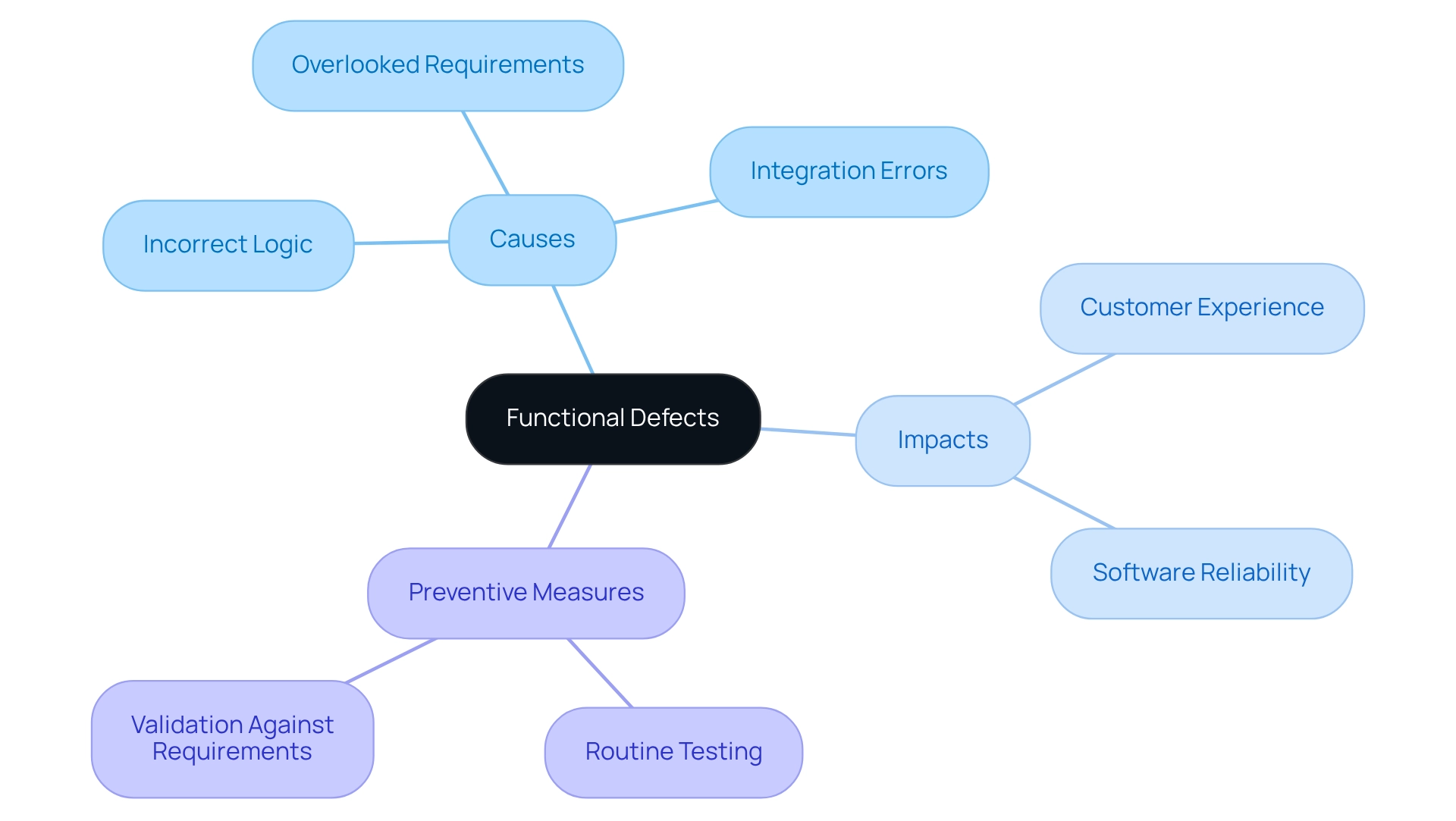
Performance Issues: Optimizing Speed and Responsiveness in Applications
Performance issues, such as slow response times, unresponsiveness, or excessive resource consumption, are common challenges that developers face. To tackle these issues effectively, programmers can employ techniques like:
- Code profiling
- Algorithm optimization
- Efficient resource management
Furthermore, regular performance testing is crucial for identifying bottlenecks and ensuring applications operate smoothly under various conditions. By addressing performance concerns, developers can significantly enhance user satisfaction and reduce the likelihood of abandonment. Are you ready to improve your coding practices? Explore these strategies to elevate your application’s performance.
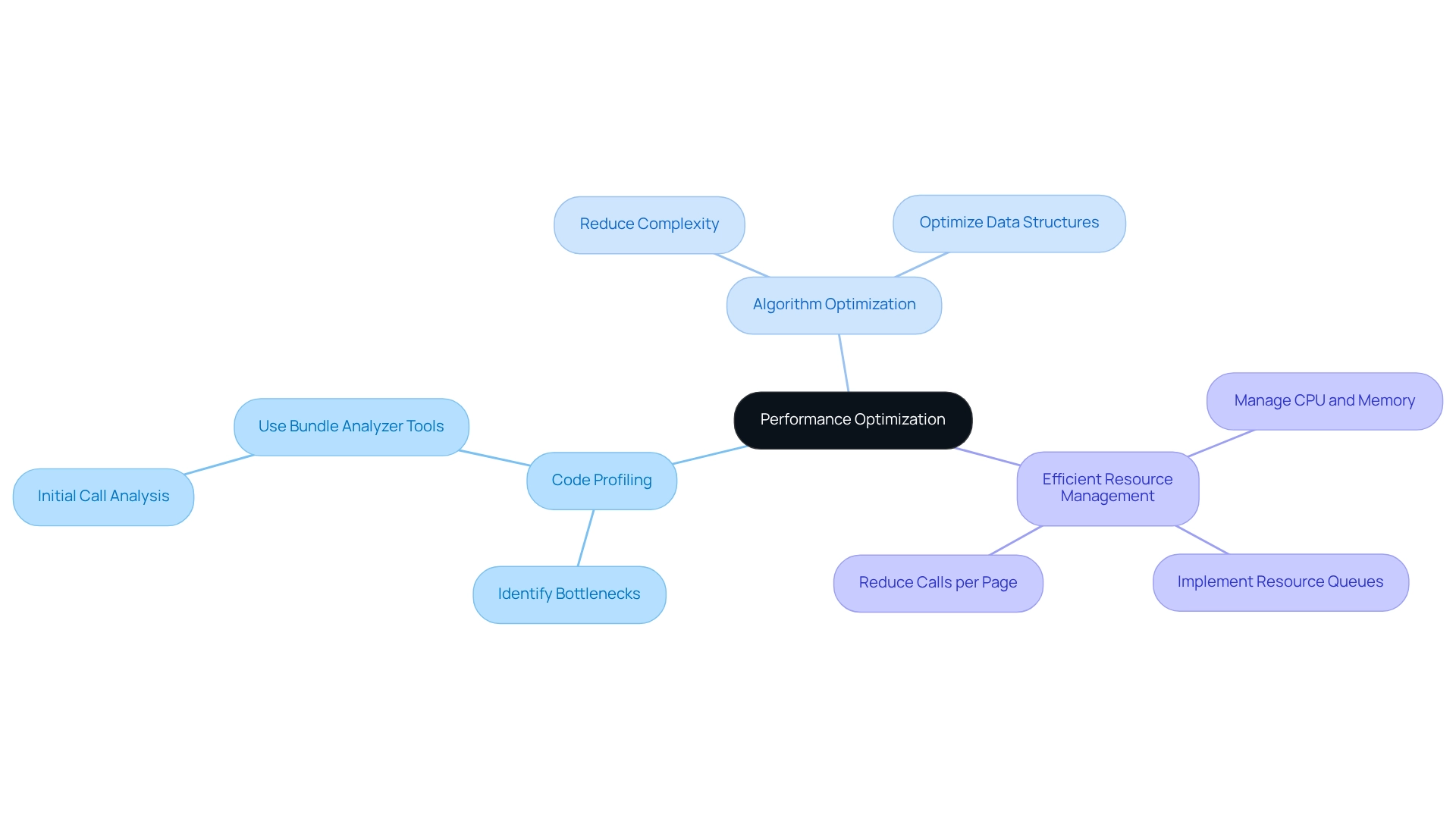
Usability Errors: Ensuring Seamless User Interaction
Usability issues arise when individuals face challenges engaging with software, often due to ambiguous navigation, inconsistent design elements, or overly complicated interfaces. In 2025, statistics reveal that a substantial percentage of users report frustrations tied to these issues, underscoring the urgent need for designers to prioritize usability in their work. To effectively minimize usability errors, developers must conduct thorough testing with participants and actively gather feedback during the design phase. Implementing best practices in interface design—such as ensuring consistency across elements, providing clear instructions, and simplifying navigation—can greatly enhance user satisfaction and alleviate frustration.
For instance, a case study illustrates the repercussions of neglecting usability; when visual and tactile cues are absent, users may incorrectly connect components, like linking an oxygen tube to intravenous access, which can lead to severe consequences. This scenario emphasizes the importance of intuitive design and the necessity for creators to proactively address potential usability concerns. As Erin Davis, Associate Research Director in Human Factors, notes, "HF specialists are well-served to have knowledge of UI design principles – and be on the lookout for design elements that do not align with them – so that product development teams can proactively mitigate use issues." By heeding expert guidance and continuously improving user interactions through usability testing, creators can develop applications that not only meet functional requirements but also foster a positive user experience.
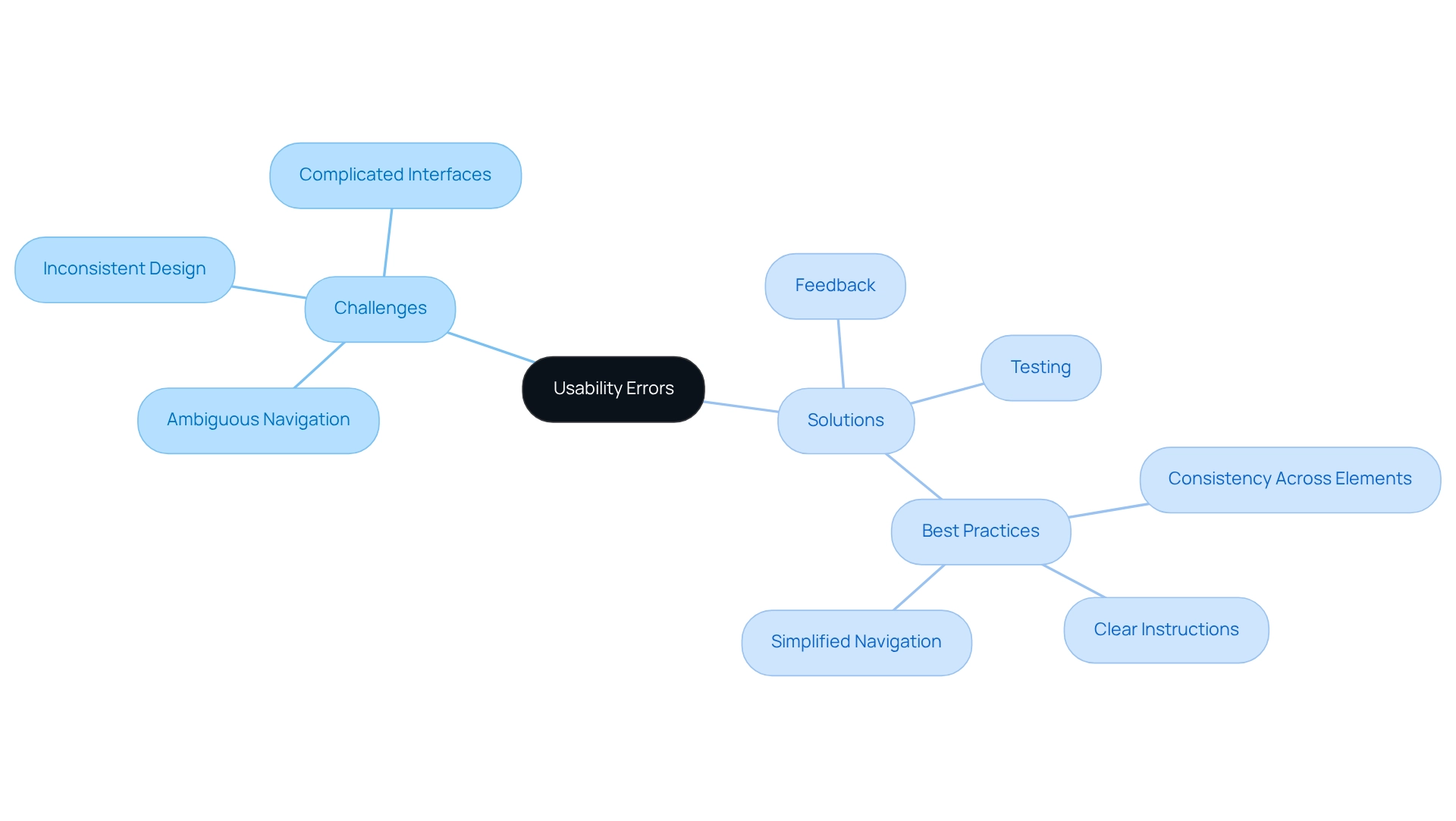
Compatibility Failures: Bridging Cross-Platform Gaps
Compatibility failures present significant challenges for developers, as software often struggles to function seamlessly across various operating systems, browsers, and devices. To effectively address these issues, it is essential for developers to prioritize comprehensive compatibility testing to avoid any technical bug throughout the development lifecycle. Implementing responsive design principles and adhering to established web standards are vital strategies to ensure consistent application performance across multiple platforms. Furthermore, regular updates and maintenance are crucial for adapting to evolving technologies and operational environments.
As we look toward 2025, the significance of compatibility testing is more pronounced than ever, with software adoption increasingly dependent on cross-platform functionality. Current statistics indicate that a technical bug causing compatibility failures can severely hinder user engagement and satisfaction, leading to decreased adoption rates. For instance, a recent case study highlighted the successful integration of an Offers module in an app, which enhanced user engagement by providing easy access to promotions during campaigns. This improvement was achieved through rigorous compatibility testing, ensuring users could apply promotion codes seamlessly across devices.
To achieve cross-platform compatibility, developers should embrace a proactive approach that incorporates automated testing tools and continuous integration practices. By doing so, they can identify and resolve compatibility issues early in the development process, ultimately resulting in a more robust and user-friendly software product.
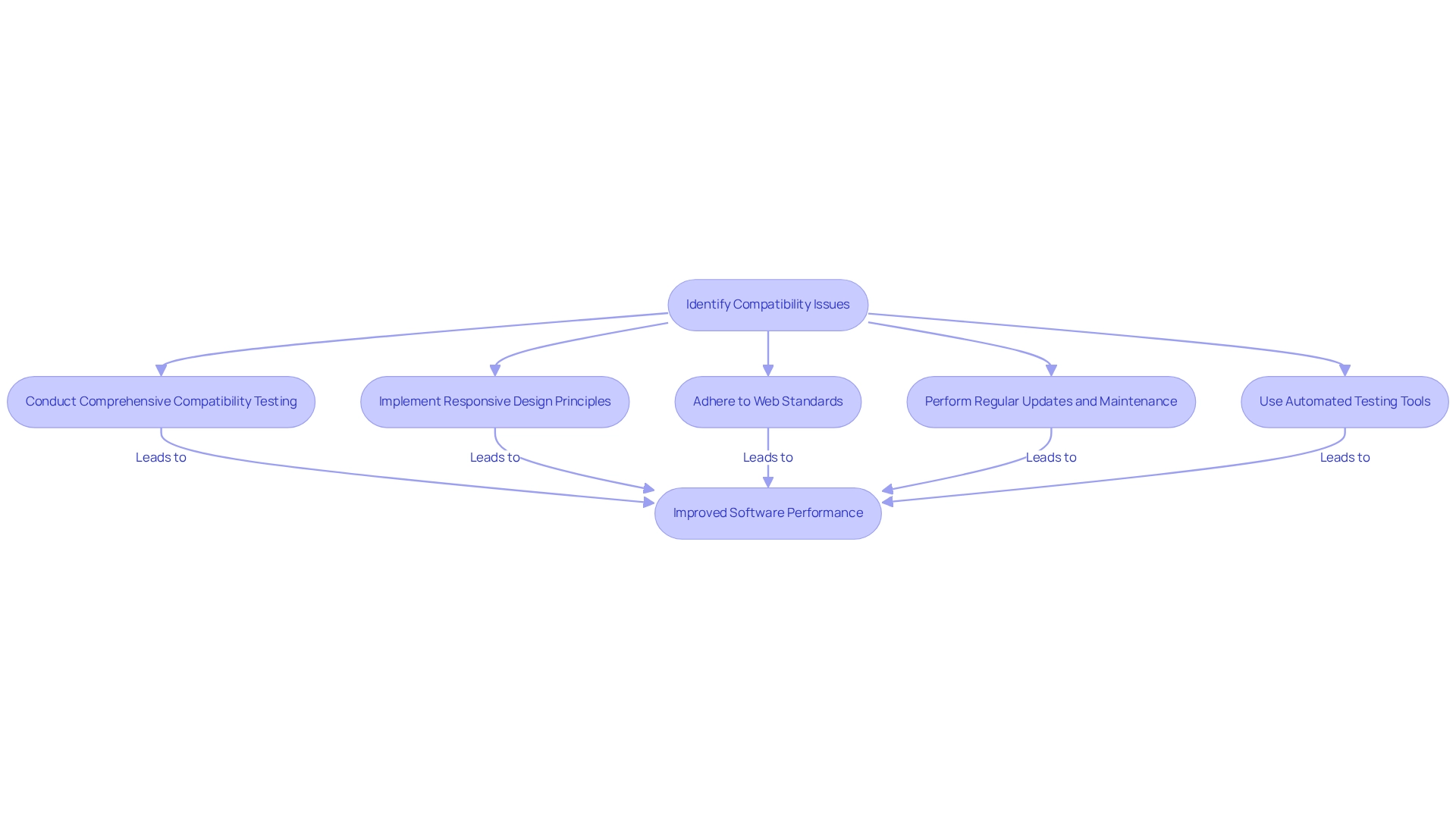
Security Vulnerabilities: Safeguarding Data Integrity
Security vulnerabilities can lead to data breaches and unauthorized access, jeopardizing individual information and application integrity. Common vulnerabilities such as SQL injection, cross-site scripting (XSS), and insecure data storage are critical concerns. Developers must implement secure coding practices, conduct regular security audits, and utilize automated tools to identify and remediate these vulnerabilities. With 24% of all cyberattacks involving ransomware, it is essential for software creators to adopt robust security measures, including input validation and encryption techniques, to mitigate these risks.
Furthermore, expert insights emphasize the importance of layered security strategies. As Morey J. Haber, Chief Security Advisor at BeyondTrust, points out, while a silver bullet for vulnerabilities may not exist, a layered approach can significantly enhance security across all applications. The healthcare sector has seen a staggering 58% increase in targeted data breaches since 2020, highlighting the urgent need for vigilance not only in healthcare but across all industries facing similar threats.
In addition, case studies reveal geographical disparities in cyberattack impacts, with Europe accounting for 32% of global cyberattacks in 2023. This data illustrates the necessity for tailored cybersecurity strategies that consider regional vulnerabilities and threats. By prioritizing security and adopting the latest practices—such as continuous monitoring and AI-driven detection—developers can protect their applications, safeguard data integrity, and maintain user trust in an increasingly complex digital landscape.
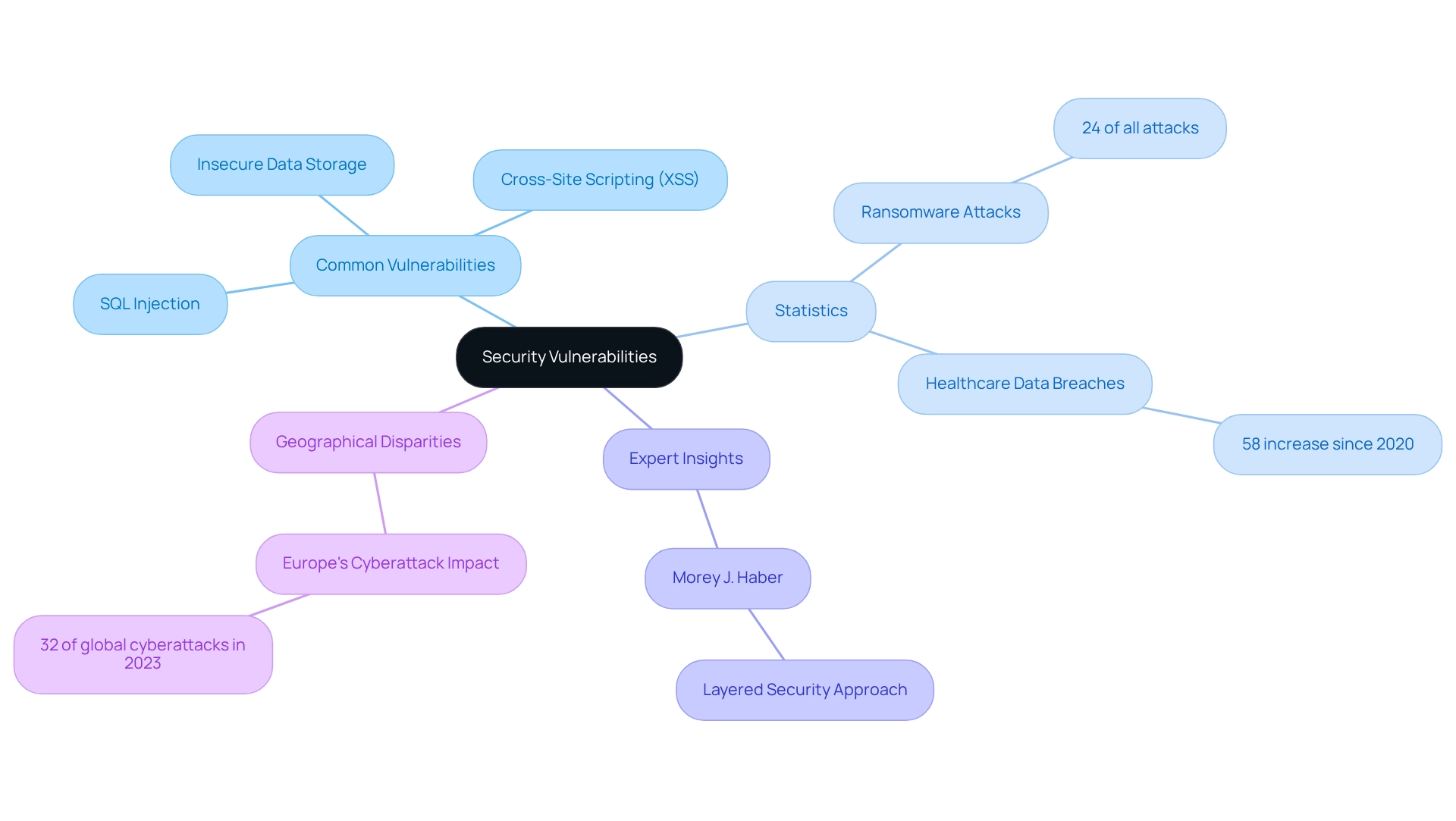
Syntax Errors: Ensuring Code Accuracy
Coding challenges are a common hurdle that developers face, particularly when it comes to syntax issues. These problems arise when code breaches the grammatical rules of the programming language, resulting in compilation failures. Missing semicolons, mismatched parentheses, and incorrect variable declarations are just a few examples. In fact, studies show that syntax issues represent about 70% of coding mistakes, underscoring the importance of precision in programming.
So, how can developers effectively tackle these challenges? Enter Kodezi, a platform designed to empower programmers by offering tools that autonomously improve codebases and fix technical bugs before they reach production. With features like syntax highlighting and real-time mistake detection, Kodezi streamlines the coding process and enhances code accuracy by providing immediate feedback. Furthermore, integrated development environments (IDEs) such as Visual Studio Code and IntelliJ IDEA complement these tools, allowing for a more efficient coding experience.
Imagine the productivity gains when syntax issues are minimized! Conducting regular code assessments and engaging in pair programming can further reduce the chances of these errors, as collaborative efforts often lead to a more thorough examination of the code. Expert opinions emphasize the significance of teaching syntax accuracy to programmers. As Alexandre M. Bayen pointed out, "A logical mistake does not produce a fault, but is a mistake because the output you receive is not the solution you anticipate."
By adopting these techniques and utilizing Kodezi, programmers can greatly reduce syntax mistakes, minimizing the risk of technical bugs, ensuring smoother project timelines and improved code quality. In addition, Kodezi not only enhances overall code quality but also assists teams in upholding professional standards, ultimately decreasing the frequency of syntax mistakes. Why not explore the tools available on Kodezi today and elevate your coding practices?
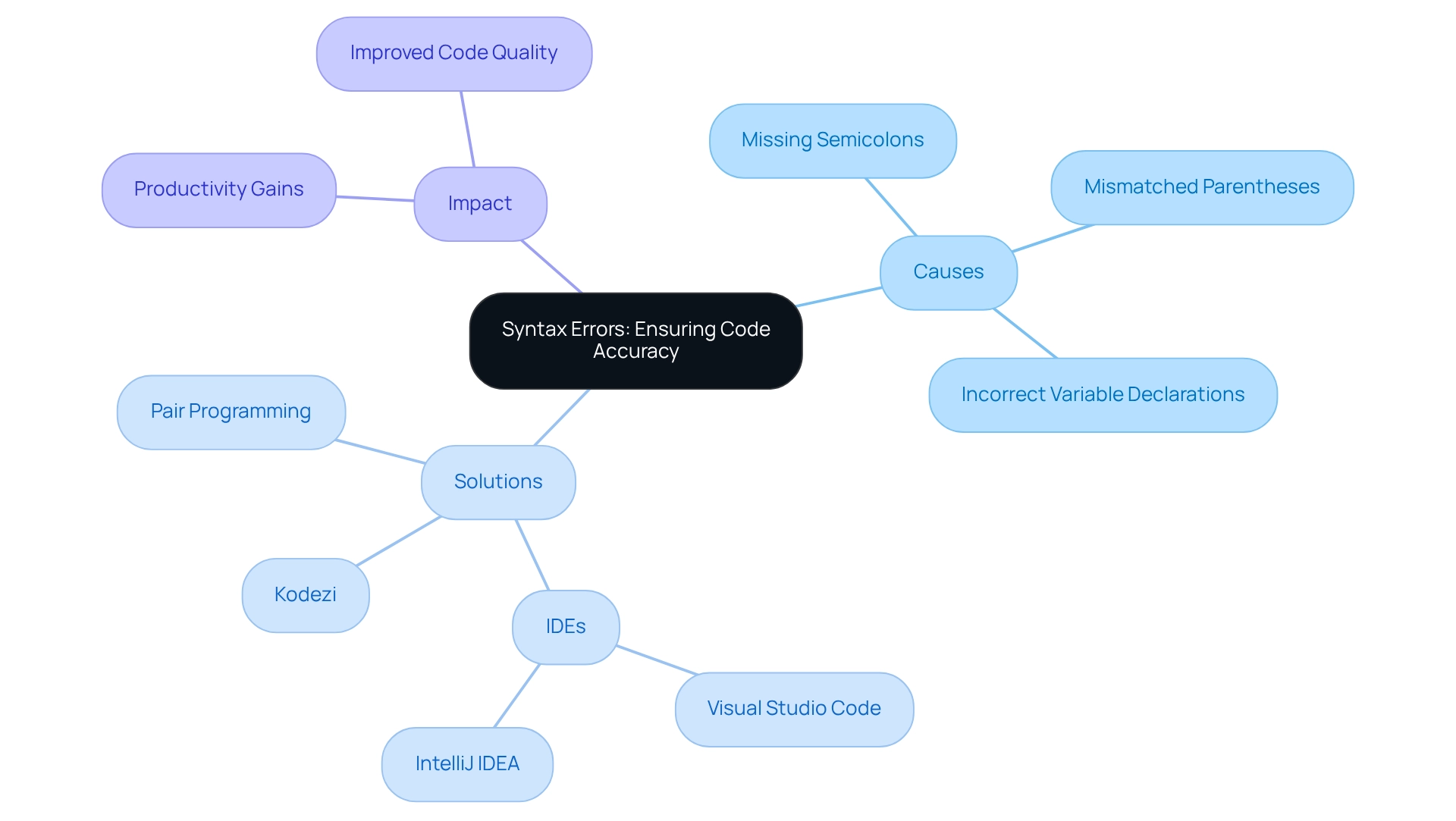
Logical Errors: Correcting Flawed Algorithms
Coding challenges are a common hurdle developers face, particularly when it comes to logical mistakes. These errors can occur when code runs without crashing but yields incorrect outcomes due to faulty reasoning. Such mistakes are often elusive, as they do not trigger warning notifications, making them difficult to detect. In fact, by 2025, logical mistakes are projected to account for approximately 30% of all program flaws, underscoring their prevalence in software development.
To effectively address these challenges, developers can turn to tools like Kodezi CLI. This powerful tool helps trace execution paths and identify discrepancies between actual outputs and expected results. Furthermore, introducing unit tests early in the development process is crucial, as they can catch logical issues before they propagate through the codebase.
What makes a methodical approach to troubleshooting essential? Expert insights emphasize the value of regularly examining code logic and engaging in peer reviews to gain fresh perspectives on potential errors. For instance, implementing predictive models as APIs can streamline this process; by leveraging frameworks like Django and Flask, developers can simplify troubleshooting and enhance the reliability of their applications.
In summary, addressing logical mistakes requires diligence and the right tools. By utilizing debugging tools and fostering a culture of collaboration, programmers can significantly mitigate the impact of these issues on software functionality. This proactive approach ultimately leads to more resilient and trustworthy applications. Why not explore the tools available on the Kodezi platform to elevate your coding practices?
Interface Discrepancies: Smoothing System Interactions
Coding challenges often arise from interface discrepancies, which can be considered a technical bug, where different system components fail to interact as expected, resulting in confusion and errors. How can developers tackle these issues effectively? By establishing clear interface specifications and adhering to design standards, programmers can minimize such problems. Furthermore, utilizing Kodezi CLI can significantly enhance this process, as it autonomously improves codebases and fixes technical bugs before they reach production. In addition to Kodezi's capabilities, regular testing and participant feedback can help identify discrepancies early, allowing for timely adjustments. By ensuring consistent interactions and leveraging Kodezi CLI's features, developers can not only improve user satisfaction but also minimize the chances of mistakes. Imagine the productivity gains when coding becomes more efficient and reliable.
For a quick start, explore the 5-minute quickstart guide and watch a demo to see firsthand how Kodezi CLI can streamline your development process. Are you ready to elevate your coding practices and experience enhanced code quality? Dive into the tools available on the platform today.
Bug vs Error: Key Differences Every Developer Should Know
In the realm of application development, developers frequently encounter challenges related to coding, particularly when it comes to understanding the terms 'technical bug' and 'error.' While these terms are often used interchangeably, they signify different concepts. A technical bug refers to a specific flaw in the application that results in unexpected behavior, while an error encompasses a wider array of issues that may arise during program execution. Recognizing these distinctions is crucial for programmers, as it facilitates precise problem diagnosis and enhances communication within teams.
Have you ever found yourself confused between a bug and an error? Clear definitions not only streamline debugging processes but also promote better collaboration among team members. For instance, effective communication techniques can significantly reduce misunderstandings related to technical issues, ultimately boosting productivity. Furthermore, a recent analysis revealed that a notable percentage of developers struggle to differentiate between bugs and errors, highlighting the importance of clarity in definitions. By prioritizing this understanding, development teams can improve their debugging efficiency and effectively resolve technical bugs, thereby elevating overall software quality.
Explore how Kodezi can assist you in addressing these challenges with its specific features designed to enhance productivity and code quality. With Kodezi, you can navigate the complexities of coding more effectively, ensuring that your team communicates clearly and efficiently.
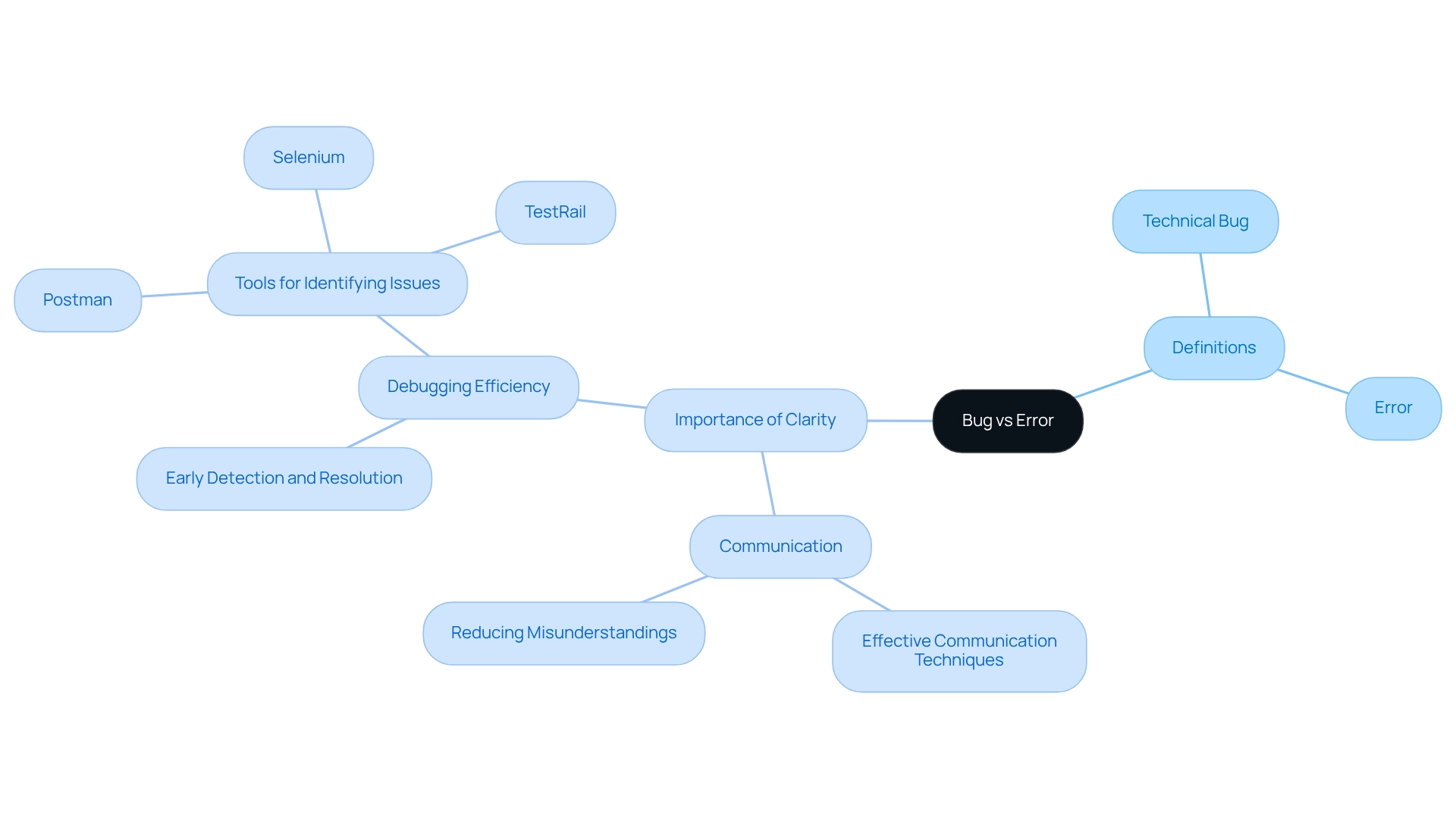
Conclusion
The landscape of software development presents significant challenges, particularly as various types of bugs emerge. Developers must navigate the complexities of functional defects, performance issues, usability errors, and security vulnerabilities to create high-quality software. Kodezi offers tools that streamline the debugging process, allowing developers to swiftly identify and resolve issues, ultimately enhancing productivity and code quality.
Effective debugging does more than improve efficiency; it significantly enhances user experiences and fosters innovation. By enabling developers to concentrate on creation rather than troubleshooting, automated debugging tools mitigate risks associated with bugs. Furthermore, they promote a culture of collaboration and continuous improvement within development teams.
In conclusion, modern developers must embrace advanced debugging solutions like Kodezi to successfully navigate the complexities of software development. By prioritizing effective debugging strategies and deepening their understanding of software issues, developers can enhance their capabilities and deliver superior products that meet the evolving demands of users. The journey toward flawless software is ongoing; however, with the right tools and knowledge, developers can dramatically reduce the occurrence of bugs and errors, paving the way for greater success in their projects.
Frequently Asked Questions
What challenges do developers face when debugging their code?
Developers often encounter significant challenges caused by technical bugs, which can impede their productivity.
How does Kodezi help with code debugging?
Kodezi's automated code debugging feature enables programmers to swiftly identify and resolve bugs within their codebases, providing comprehensive explanations of any technical bug encountered and the solutions applied.
What is the impact of using Kodezi on programmer productivity?
By streamlining the debugging process, Kodezi significantly boosts programmer productivity, allowing tasks to be completed up to two times quicker than conventional methods.
How does Kodezi assist developers managing multiple projects?
Kodezi helps ensure that code adheres to professional standards without compromising quality, which is crucial for programmers managing multiple projects.
Can you provide an example of Kodezi's effectiveness in real-world scenarios?
Developers have reported that Kodezi enables them to maintain high-quality code while navigating complex coding requirements, simplifying the debugging process compared to generative AI tools.
What are functional defects, and why are they significant for developers?
Functional defects occur when applications fail to operate as intended, stemming from incorrect logic, overlooked requirements, or integration errors. They are significant because they directly impact customer experience and software reliability.
How can developers identify functional defects early in the development process?
Routine testing and validation against requirements can help identify functional defects early, ensuring that the final product meets expectations.
What performance issues do developers commonly face?
Common performance issues include slow response times, unresponsiveness, and excessive resource consumption.
What techniques can programmers use to address performance issues?
Programmers can employ techniques like code profiling, algorithm optimization, and efficient resource management to tackle performance issues effectively.
Why is regular performance testing important for developers?
Regular performance testing is crucial for identifying bottlenecks and ensuring applications operate smoothly under various conditions, enhancing user satisfaction and reducing the likelihood of abandonment.




